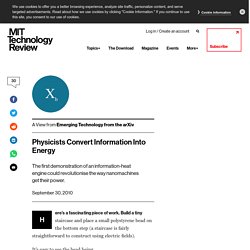

They Stormed the Capitol. Their Apps Tracked Them. In 2019, a source came to us with a digital file containing the precise locations of more than 12 million individual smartphones for several months in 2016 and 2017.

The data is supposed to be anonymous, but it isn’t. We found celebrities, Pentagon officials and average Americans. It became clear that this data — collected by smartphone apps and then fed into a dizzyingly complex digital advertising ecosystem — was a liability to national security, to free assembly and to citizens living mundane lives. It provided an intimate record of people whether they were visiting drug treatment centers, strip clubs, casinos, abortion clinics or places of worship. Surrendering our privacy to the government would be foolish enough. Now, one year later, we’re in a very similar position.
'I'm extremely controversial': the psychologist rethinking human emotion. In early March, as the world began to realise that coronavirus wasn’t going to go quietly, psychology professor Lisa Feldman Barrett was thousands of miles away from home.

“I went to New Zealand because I was getting an honorary degree,” she tells me over the phone from lockdown in Newton, a leafy suburb of Boston, Massachusetts, where she runs a lab devoted to the study of emotions. She had arranged the trip to coincide with spring break so her college-age daughter could join her and see the sights. But as countries around the world began to impose restrictions, she started having second thoughts. “I was asking myself, should she really be coming, or should we be going home? Like, how serious is this exactly?” This is only an odd choice of words if you’re unfamiliar with the paradigm-busting ideas set out in her extraordinary 2018 book, How Emotions Are Made.
If this seems like a robotic response to give a distressed family member, in reality Barrett is anything but cold. Here's how your body gains immunity to coronavirus. As the daughter of an air force officer and a nurse, I am fascinated by defence systems.

There is none more impressive than the human immune system, equipped as it is with a rich arsenal to defend against different types of pathogen. Viruses have evolved to trick, bypass and evade these defences. Our immune systems have, in turn, learned to recognise and deter these virus stealth tactics. In Covid-19, the enemy is a tiny piece of genetic material wearing a lipid coat and a protein crown. So how is our immune system able to defend against viral infections, and how does this applies to Covid-19? Think of a virus as a robot; it cannot reproduce so it needs a factory of materials – proteins, lipids and nucleotides – to build copies of itself. Once inside, the virus commandeers the cell and borrows cellular machinery to build more viruses before immune cells detect the intruders and raise the alarm. The virus’s enemy superpower is spreading.
Our secret weapon is research. Patient plays violin during her brain surgery. Antarctica melting: Climate change and the journey to the 'doomsday glacier' The images are murky at first.

Sediment sweeps past the camera as Icefin, a bright yellow remotely operated robot submarine, moves tentatively forward under the ice. Here's What the World Will Look Like in 2030 ... Right? Mind Control for the Masses—No Implant Needed. Digital dystopia: how algorithms punish the poor. All around the world, from small-town Illinois in the US to Rochdale in England, from Perth, Australia, to Dumka in northern India, a revolution is under way in how governments treat the poor.

You can’t see it happening, and may have heard nothing about it. It’s being planned by engineers and coders behind closed doors, in secure government locations far from public view. Only mathematicians and computer scientists fully understand the sea change, powered as it is by artificial intelligence (AI), predictive algorithms, risk modeling and biometrics. But if you are one of the millions of vulnerable people at the receiving end of the radical reshaping of welfare benefits, you know it is real and that its consequences can be serious – even deadly. The Guardian has spent the past three months investigating how billions are being poured into AI innovations that are explosively recasting how low-income people interact with the state.
Physics. Urban&Rural. The basis of the universe may not be energy or matter but information. Physicists Convert Information Into Energy. Here’s a fascinating piece of work.

Build a tiny staircase and place a small polystyrene bead on the bottom step (a staircase is fairly straightforward to construct using electric fields). It’s easy to see the bead being jostled around by the random motion of molecules in the surrounding air, the well-known phenomenon of Brownian motion. Most of the time, the Brownian motion tends to knock the bead down the stairs but sometimes the jostling is powerful enough to push the bead up a step. Keep a close eye on the bead using a video camera and every time you see it go up a step, change the electric field so that it cannot drop back down again.
Der Projektor der Zukunft: Interaktive Projektionen wie bei Star Trek. General. Biology. Transport. IT.